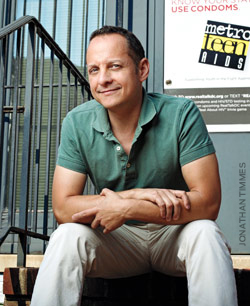 Adam Tenner is a 20-year veteran in the community health field who has been working on the ground with at-risk and HIV-positive youth since the beginning of his career.
Adam Tenner is a 20-year veteran in the community health field who has been working on the ground with at-risk and HIV-positive youth since the beginning of his career.
He started his HIV work in college. After he lost one of his teachers to AIDS, he advocated making condoms available on his historically conservative campus, at the peak of the epidemic. Tenner then moved to Seattle, where he did outreach to homeless LGBT youth at a local nonprofit.
“I don’t think my story is unique for that era,” says Tenner, who is a gay, HIV-negative ally. “I think most of us who remember the earlier years of the epidemic had that incredible kind of loss and we committed to trying to figure out how to end it.”
After just five years, Tenner became the director of the program. By 1997, the young advocate had become the head of HIV prevention planning for the Seattle-King County Health Department. He eventually moved to Washington, DC, 13 years ago and soon became executive director of Metro TeenAIDS.
The group works with HIV-positive youth, their families and local schools to help get the message out about the virus. The organization also hosts several youth leadership programs that have inspired and trained hundreds of young health workers and activists to get into the field.
“It’s not enough to show a short video or a PowerPoint presentation when we’re trying to end the HIV/AIDS epidemic,” Tenner says. “It really is about engaging young people to go tell their stories to city leaders, to Congress and also out into the community, to their friends and their parents and their grandparents.”
Tenner’s vision of youth power seems to be working. Since 2007, DC’s rate of newly diagnosed HIV/AIDS cases has declined an astounding 47 percent. Thanks to Metro TeenAIDS, condoms are also more available in the nation’s capital than almost any other jurisdiction in the country.
However, Tenner understands that the fight against the virus is long from over and that it will take the next generation of activists to finally end the HIV/AIDS epidemic. “It’s certainly my hope that a young person takes my job in the future,” Tenner says. “When we offer them the opportunity, they’ll rise to the occasion.”
Empowering the Next Generation






Comments
Comments